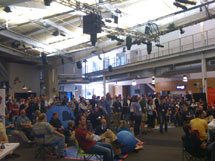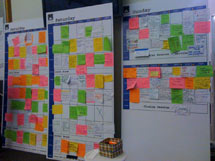
Handy Links
SLAC News Center
SLAC Today
- Subscribe
- Archives: Feb 2006-May 20, 2011
- Archives: May 23, 2011 and later
- Submit Feedback or Story Ideas
- About SLAC Today
SLAC News
Lab News
- Interactions
- Lightsources.org
- ILC NewsLine
- Int'l Science Grid This Week
- Fermilab Today
- Berkeley Lab News
- @brookhaven TODAY
- DOE Pulse
- CERN Courier
- DESY inForm
- US / LHC
SLAC Links
- Emergency
- Safety
- Policy Repository
- Site Entry Form

- Site Maps
- M & O Review
- Computing Status & Calendar
- SLAC Colloquium
- SLACspeak
- SLACspace
- SLAC Logo
- Café Menu
- Flea Market
- Web E-mail
- Marguerite Shuttle
- Discount Commuter Passes
-
Award Reporting Form
- SPIRES
- SciDoc
- Activity Groups
- Library
Stanford
Around the Bay
SLACers at SciFoo
A three-day science extravaganza, dubbed Science Foo Camp, brought several hundred scientists and science enthusiasts to the Bay Area July 30–August 1 for a weekend of unbridled ideas, discussions and debates. There in the mix were two of SLAC's finest: Eva Silverstein, theoretical physics professor at SLAC and Stanford; and Hari Manoharan, associate professor of physics at Stanford and SLAC's Stanford Institute for Materials and Energy Sciences.
"It was fantastic," said Manoharan. "I have no idea why I was invited to this thing, nor did anyone else I talked to there. But it was really fun. There were so many brilliant people from all different fields, with science as the uniting element."
The weekend began with the 200-plus attendees introducing themselves with three words describing their interests. For Manoharan, who builds nano-devices from single-atom building blocks, "very small physics" did it. Silverstein, whose work focuses on the theory behind high-energy physics, gravity and string theory, stretched her three words to "cosmology, very-short-distance-physics, very-long-distance-physics."
(Image courtesy Steve Hsu.)
After these brief introductions, the weekend kicked off with what Manoharan called a "free for all" in which attendees filled in a blank conference schedule, signing up to give talks on a wide range of science topics. The program continued to change every hour, as the patchwork schedule morphed and morphed again, and conversations inevitably stretched from 8 a.m. to midnight each day.
"We had a great time running our session, with insightful comments and questions coming out in the discussion," said Silverstein, who led a talk on applications of string theory with colleague David Tong of the University of Cambridge. "The audience included people well outside the field, including a reporter from the BBC and someone from Google."
Manoharan, who co-led a session on music, sound and science (along with a biologist/symphony violinist and a cosmologist/jazz saxophonist), said he was most interested in sessions covering the intersection of society and science. One such talk, led by philosopher Peter Singer, covered the ethics and psychology behind why people contribute money to charities that fight poverty. "It was interesting to hear what helps encourage people to do this," Manoharan said. "We had a really lively debate, without much conclusion. But it was really fun nonetheless."
Silverstein, who said she most enjoyed sessions on neuroscience, scientific approaches to world food needs, and the scientific issues facing the Innocence Project, added, "The spirit of the whole weekend was not to focus on your own field. It was great."
Now in its fifth year, "SciFoo" is hosted by Nature Publishing Group, Google and O'Reilly Media. ("Foo" stands for "Friends of O'Reilly"). For more on SciFoo, view this Nature video about the 2009 event.
—Kelen Tuttle
SLAC Today, August 5, 2010

